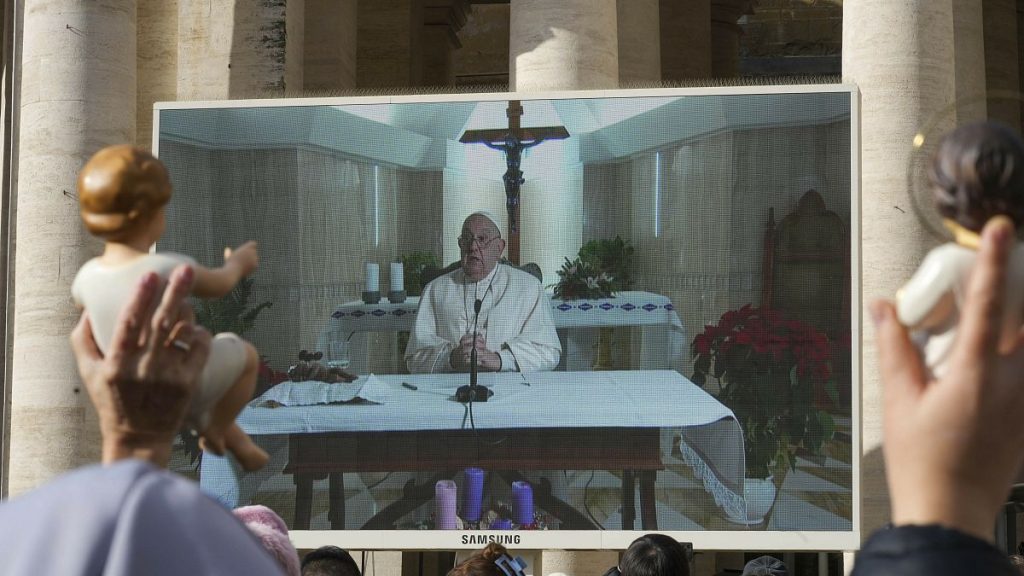Pope Francis’s Christmas Appeal for Peace Amidst Global Conflicts
Pope Francis, in his Sunday Angelus prayer preceding Christmas, delivered a poignant plea for a global ceasefire, emphasizing the devastating impact of ongoing conflicts, particularly in Ukraine and Gaza. The 88-year-old pontiff, speaking from his Santa Marta residence due to cold weather and a demanding Christmas schedule, urged an end to hostilities so that the world could hear the resonant message of peace embodied in Christmas carols instead of the destructive sounds of warfare. His call resonated with a deep concern for the innocent victims of these conflicts, especially children, and highlighted the tragic destruction of civilian infrastructure, including schools, hospitals, and churches.
The Pope’s message focused on the enduring suffering of Ukrainians, who are approaching the grim three-year mark of the war in their country. He lamented the relentless attacks on Ukrainian cities, which continue to inflict damage on vital institutions like schools and hospitals, places meant to nurture and heal, not be targets of violence. His anguish extended to the besieged Gaza Strip, where he denounced the “cruelty” of the conflict, specifically citing the heart-wrenching realities of children being targeted and schools and hospitals being bombed. This strong condemnation reflects the Pope’s unwavering commitment to protecting the most vulnerable and upholding the sanctity of human life.
Francis highlighted the obstruction faced by Cardinal Pierbattista Pizzaballa, the leader of the Catholic Church in the Holy Land, who was initially prevented from entering Gaza due to Israeli bombing. This incident underscored the complexities and challenges in delivering humanitarian aid and spiritual comfort in conflict zones. While Israeli authorities eventually granted access to Cardinal Pizzaballa to celebrate a pre-Christmas Mass, the initial denial symbolizes the difficulties in reaching those in dire need amidst the ongoing hostilities. The Pope’s mention of this incident underscores the urgent need for unimpeded humanitarian access to conflict zones.
The Pope’s Christmas message, while focused on peace, also indirectly criticized Israel’s actions in Gaza. He expressed deep concern about the reported targeting of civilian infrastructure and the impact on the innocent population. This criticism, though implicit, underscores the Vatican’s stance on the protection of civilians in conflict and adds weight to his call for a ceasefire. The Pope’s message stands in contrast to Israel’s justification for its actions, which cites the need to target the militant group Hamas following their incursion and hostage-taking in October.
The Vatican’s decision to have the Pope deliver his Sunday blessing indoors highlights the importance placed on his health and well-being, especially considering his advanced age and the demanding schedule ahead. The 88-year-old pontiff, known for his history of bronchitis and other health challenges, needs to conserve his energy for the upcoming Holy Year inauguration, Christmas Eve and Christmas Day celebrations, and a visit to Rome’s main prison. These engagements are central to his papal duties and require considerable physical and mental exertion.
Pope Francis’s Christmas message resonates with his consistent advocacy for peace and his profound concern for the victims of conflict. His call for a global ceasefire is a poignant reminder of the human cost of war and the urgent need for peaceful resolutions. By highlighting the suffering in Ukraine and Gaza, he brings attention to the devastating consequences of ongoing conflicts, particularly for vulnerable populations. His message emphasizes the importance of dialogue, diplomacy, and compassion in achieving lasting peace, encapsulating the true spirit of Christmas and offering a beacon of hope amid global turmoil.














